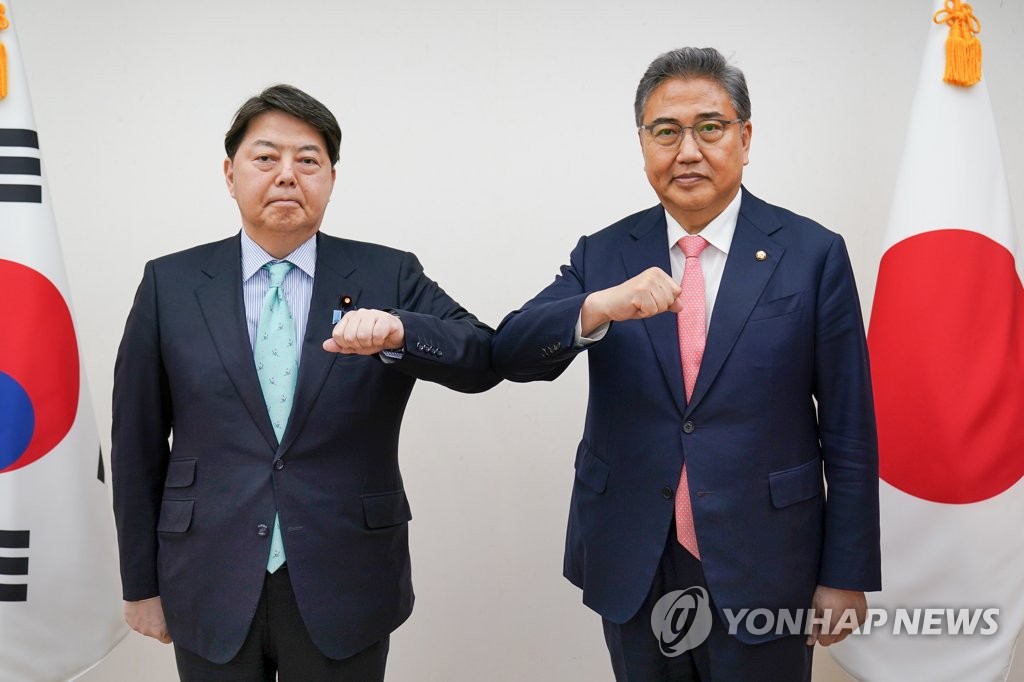- California Assembly OKs highest minimum wage in nation
- S. Korea unveils first graphic cigarette warnings
- US joins with South Korea, Japan in bid to deter North Korea
- LPGA golfer Chun In-gee finally back in action
- S. Korea won’t be top seed in final World Cup qualification round
- US men’s soccer misses 2nd straight Olympics
- US back on track in qualifying with 4-0 win over Guatemala
- High-intensity workout injuries spawn cottage industry
- CDC expands range of Zika mosquitoes into parts of Northeast
- Who knew? ‘The Walking Dead’ is helping families connect
S. Korea, Japan hold foreign ministerial talks on warming bilateral ties
The top diplomats of South Korea and Japan held talks here Monday to discuss pending bilateral issues, including drawn-out disputes over compensating Korean victims of wartime forced labor.
Foreign Minister Park Jin met with his Japanese counterpart, Yoshimasa Hayashi, as he began his first official visit to Japan since taking in May, a move reflecting the Yoon Suk-yeol administration’s efforts to mend soured bilateral relations. The two are scheduled to have a “working dinner” following the talks.
It marks the first time for Seoul’s top diplomat to travel to Japan in more than four years in order to have one-on-one talks with his or her local counterpart. In December 2017, then Foreign Minister Kang Kyung-wha visited there for such a bilateral session.
During his three-day stay in Japan, the minister is also expected to pay a courtesy call on Japanese Prime Minister Fumio Kishida as well as other senior officials and politicians.
Speaking to reporters just before his departure, Park said the two sides plan to have “comprehensive discussions” on various pending issues, including an intelligence-sharing pact. He earlier raised the need for Seoul and Tokyo to “normalize” the General Security of Military Information Agreement (GSOMIA), which is widely regarded as having been underused since 2019, when the Moon Jae-in government decided to “conditionally” put off its expiration in protest at Tokyo’s unilateral export curbs against Seoul.

In this file photo provided by South Korea’s foreign ministry on May 9, 2022, Park Jin (R), then foreign minister-designate, and Japanese Foreign Minister Yoshimasa Hayashi bump elbows during their meeting in Seoul. (PHOTO NOT FOR SALE) (Yonhap)
It remains uncertain whether his trip will produce a breakthrough in efforts to put the GSOMIA operation back on normal track and mend Seoul-Tokyo ties long strained due to history and territorial rows.
In particular, the two sides face the urgency of resolving the problem of how to compensate Koreans forced into hard labor during World War II, when Korean was under Japan’s brutal colonial rule, as South Korea’s Supreme Court is expected to hand down its final verdicts on whether to allow the liquidation of assets held by two Japanese companies as early as in August.
Tokyo officials have called on the Seoul government to come up with reasonable solutions to avoid liquidation of the Japanese firms, which have refused to pay Korean victims, claiming that all reparation issues were settled under a 1965 accord aimed at normalizing bilateral diplomatic relations.
South Korea’s new government-private body, launched earlier this month, is still working to come up with specific proposals on ways for a resolution to the thorny issue.
The conservative Yoon administration has repeatedly stated a commitment to improving Seoul’s relations with Tokyo in tandem with a push for bolstering trilateral security cooperation involving Washington against growing threats from Pyongyang.











